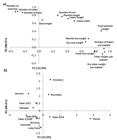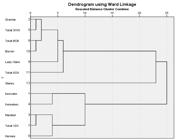ABSTRACT
Salinity is one of the abiotic stresses that lead to an imbalance in the physiological processes of the plants and also affects potato growth and productivity in maınly semi-arid and growing areas. The accumulation of Na+ and Cl- ions in the cells is very toxic can influence all mechanisms and the enzymatic actions of the plants. In vitro screening of plant genotypes for osmotic stress represents a valuable tool as an alternative to field trials and can be applied based on osmotic stress tolerance. The main goal of this study was to reveal variability in salinity stress tolerance of potato varieties using in vitro screening. Stem cuttings consisting of a single node of different varieties were cultured on Murashige and Skoog (MS) medium supplemented with different concentrations of sodium chloride (NaCl) (0, 50, 100 and 150 mM). The differences among the plantlet length, number of branches, number of nodes, number of the leaflet, leaflet width, leaflet length, root length, number of the root, fresh plantlet weight, dry plantlet weight of all varieties were negatively influenced by all NaCl concentrations tested. Microtuberization and stolon growth of the varieties were also completely inhibited at high concentrations (100-150 mM). The Principal components analysis (PCA) was applied to the data matrix (15 morphological characteristics x 12 potato varieties) of the potato varieties. Also, a hierarchical cluster analysis (HCA) was used to identify the possible nearest and similarity of all morphological characteristics analyzed of the potato varieties. In grouping potato varieties, HCA and PCA results were found to be similar. We can speculate about the responses of morphological similarities of the potato varieties against salt stress. We concluded that Innovator and Kennebec are respectively the most salt-tolerant varieties. Hermes was moderately salt-tolerant and microtuberization capacity of Slaney was also high under salt stress conditions.
Index terms:
Osmotic tolerance; microtuberization; plant toxicity

 Thumbnail
Thumbnail
 Thumbnail
Thumbnail
 Thumbnail
Thumbnail
 Thumbnail
Thumbnail
 Thumbnail
Thumbnail
 Thumbnail
Thumbnail





